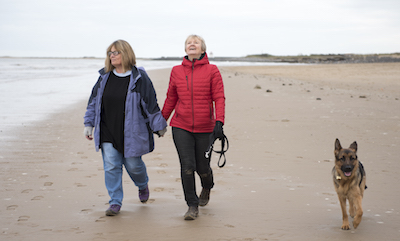Employment Status Affects Resilience of Sexual Minority Breast Cancer Survivors.

A growing body of research is focusing on finding factors that improve resilience, the ability to work through difficult situations while remaining unharmed or even growing stronger. So far, most research on LGBTQ resilience in the face of disease has focused on gay and bisexual men and HIV.
Now, a new study led by School of Public Health researchers on breast cancer survivors finds a range of factors improve resilience in women of all sexual orientations equally, but unemployment reduces resilience only in sexual minority women.
The study, published in LGBT Health, finds social support, “fighting spirit,” and giving control to a “higher power” are similarly associated with greater resilience in breast cancer survivors of all sexual orientations, while unemployment may reduce resilience in sexual minority women but not in straight women.
“In the context of breast cancer, very little work has examined assets like resilience that interventions could leverage to improve survivors’ well-being, especially among sexual minority women who experience greater risk of breast cancer than straight women,” says lead author Angela Bazzi, assistant professor of community health sciences.
“The reasons why unemployed sexual minority women had lower resilience than employed sexual minority women, and why we didn’t see these differences among heterosexual women, could reflect important contextual factors, like social stressors or resources, that influence their health and well-being.”
The researchers recruited 540 breast cancer survivors from October 2011 to June 2012 via the Army of Women, including 339 heterosexual women and 201 women who identified as lesbian, bisexual, or reported having a female partner. The researchers then matched heterosexual and sexual minority participants who were within five years in age and had experienced similar forms of breast cancer, similar treatment, and similar timing of diagnosis.
In telephone surveys, trained interviewers measured cancer coping using five subscales of the 29-item Mental Adjustment to Cancer scale: “fighting spirit,” helplessness/hopelessness, anxious preoccupation, fatalism (giving control to a “higher power” and living day by day), and cognitive avoidance. They measured resilience with the 14-item Resilience Scale, which assesses the concepts of self-reliance, equanimity (recognition of one’s own wisdom and optimism in one’s ability to “take things in stride”), perseverance, and existential aloneness (accepting and living with oneself and being able to “go it alone” if necessary). They also gathered data on sociodemographic, medical, psychosocial, and interpersonal factors, including social support.
For both heterosexual and sexual minority women, the researchers found social support was the biggest factor for increased resilience. More “fighting spirit” was also associated with greater resilience, while helplessness/hopelessness and anxious preoccupation were associated with less resilience. Having received mental health counseling before receiving a breast cancer diagnosis had the greatest negative association with resilience, possibly because of the effect of preexisting mental health issues.
Sexual orientation was not independently associated with resilience. However, the researchers found a substantial decrease in resilience for unemployed sexual minority women compared to employed sexual minority women, but no association between employment and resilience among heterosexual women.
“These findings tell us that social support and other factors associated with resilience could be leveraged by interventions to improve the health and well-being of breast cancer survivors of different sexual orientations,” Bazzi says. “Having resilience doesn’t immediately equate to thriving, but it may help people bounce back from distressing situations and the many forms of adversity experienced by sexual minority populations.”
The other SPH co-authors were Ulrike Boehmer, associate professor of community health sciences, and Michael Winter, associate director of statistical programming at the Biostatistics & Epidemiology Data Analytics Center. The other co-authors were Melissa Clark of the University of Massachusetts Medical School and Al Ozonoff of Boston Children’s Hospital and Harvard Medical School.